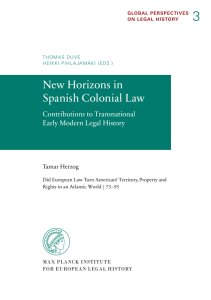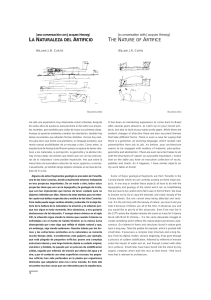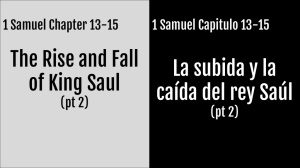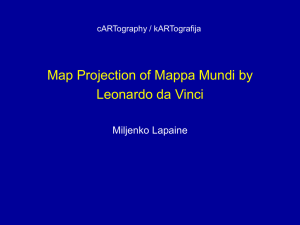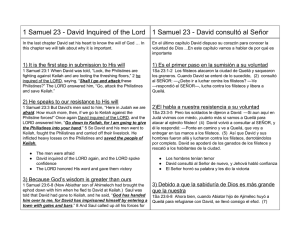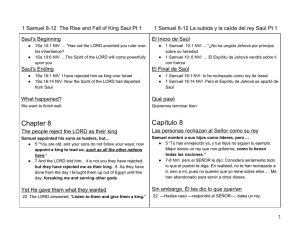Attempt and Reckless Endangerment in Saul Bellow`s Herzog
Anuncio
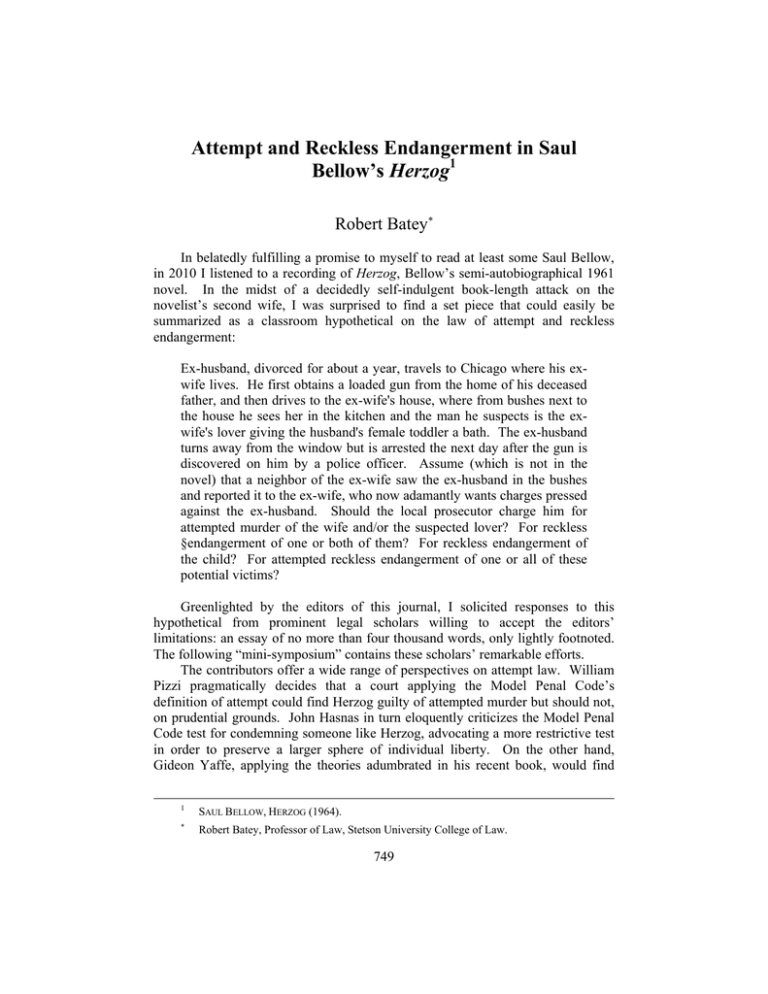
Attempt and Reckless Endangerment in Saul Bellow’s Herzog1 Robert Batey In belatedly fulfilling a promise to myself to read at least some Saul Bellow, in 2010 I listened to a recording of Herzog, Bellow’s semi-autobiographical 1961 novel. In the midst of a decidedly self-indulgent book-length attack on the novelist’s second wife, I was surprised to find a set piece that could easily be summarized as a classroom hypothetical on the law of attempt and reckless endangerment: Ex-husband, divorced for about a year, travels to Chicago where his exwife lives. He first obtains a loaded gun from the home of his deceased father, and then drives to the ex-wife's house, where from bushes next to the house he sees her in the kitchen and the man he suspects is the exwife's lover giving the husband's female toddler a bath. The ex-husband turns away from the window but is arrested the next day after the gun is discovered on him by a police officer. Assume (which is not in the novel) that a neighbor of the ex-wife saw the ex-husband in the bushes and reported it to the ex-wife, who now adamantly wants charges pressed against the ex-husband. Should the local prosecutor charge him for attempted murder of the wife and/or the suspected lover? For reckless §endangerment of one or both of them? For reckless endangerment of the child? For attempted reckless endangerment of one or all of these potential victims? Greenlighted by the editors of this journal, I solicited responses to this hypothetical from prominent legal scholars willing to accept the editors’ limitations: an essay of no more than four thousand words, only lightly footnoted. The following “mini-symposium” contains these scholars’ remarkable efforts. The contributors offer a wide range of perspectives on attempt law. William Pizzi pragmatically decides that a court applying the Model Penal Code’s definition of attempt could find Herzog guilty of attempted murder but should not, on prudential grounds. John Hasnas in turn eloquently criticizes the Model Penal Code test for condemning someone like Herzog, advocating a more restrictive test in order to preserve a larger sphere of individual liberty. On the other hand, Gideon Yaffe, applying the theories adumbrated in his recent book, would find 1 SAUL BELLOW, HERZOG (1964). Robert Batey, Professor of Law, Stetson University College of Law. 749 750 OHIO STATE JOURNAL OF CRIMINAL LAW [Vol 9:749 Herzog guilty of attempt, because of the resolve to kill with which he started. Michael Cahill agrees with this result as to the definition of attempt, but turns quickly to Herzog’s renunciation or abandonment defense, which Cahill finds applicable and then uses as a springboard to discuss inchoate crimes in general. To complete the circle, Pizzi also takes up the abandonment defense, questioning whether it would work for Herzog, while Yaffe contends that abandonment should at most merely mitigate Herzog’s sentence. While all the contributors would acquit Herzog of reckless endangerment, they arrive at this conclusion by different means. Yaffe presents the strongest argument for liability, once again looking at the course of conduct Herzog’s resolve to kill would have entailed, but ultimately rejects this reasoning on grounds of common sense. In a crucial footnote, Hasnas, analogizing to his treatment of attempt, would construe reckless endangerment narrowly—on liberty grounds—so as to acquit Herzog. Pizzi and Cahill apply the Model Penal Code definition of reckless endangerment, which they contend Herzog has not met. Both imply, however, that the result would be different if Herzog had pointed his gun at either of his would-be victims. This conclusion suggests that Herzog might be guilty of attempted reckless endangerment, a possibility that sparks more disagreement. Hasnas (in that crucial footnote) denies as a matter of theory the possibility of attempting to be reckless, a position with which Pizzi and Yaffe somewhat grudgingly seem to agree. Cahill, on the other hand, squarely argues for attempted reckless endangerment as a theoretical matter and apparently would find Herzog guilty of that crime, but for his renunciation defense. Besides these doctrinal questions, each of the essays explores jurisprudential issues: Pizzi and Hasnas touch on prosecutorial ethics, Yaffe and Cahill delve deeply into the meaning of the inchoate, and Hasnas expounds a political theory that animates much of American criminal law. No one knows whether the late Saul Bellow would have been happy to have spawned such a rich conversation, but all those interested in criminal justice can certainly benefit from it.
